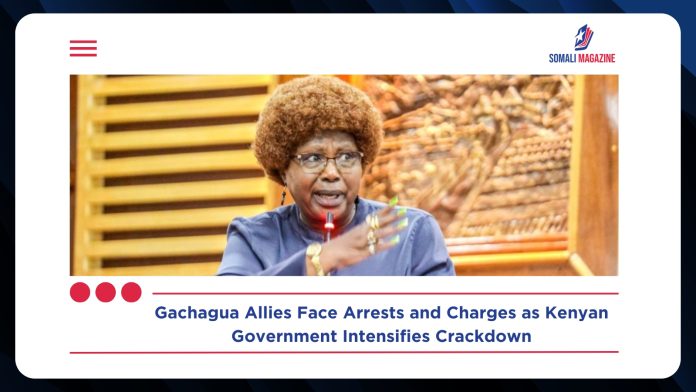Facebook Twitter (X) Instagram Somali Magazine - People's Magazine
Tough times for Gachagua allies haunted by Kenyan government, with arrests, court summons, and terrorism charges mounting against close associates of the impeached Deputy President Rigathi Gachagua. The political fallout from the July 7 Saba Saba protests has triggered a wave of detentions and investigations targeting lawmakers and youth leaders aligned with Gachagua, raising concerns over political persecution and the erosion of civil liberties.
Naivasha MP Jayne Kihara was arrested at her home by officers from the Directorate of Criminal Investigations (DCI) and detained overnight before appearing in court. Her arrest follows that of Gitonga Mukunji, the youthful Manyatta MP, who was accused of financing violence during the protests in Juja. Both are known allies of Gachagua and have previously faced scrutiny over their political activism.
The crackdown has extended to youth leaders, including Peter Kinyanjui alias Kawanjiru, the national youth leader of the Democracy for Citizens Party (DCP), which is led by Gachagua. Kawanjiru was abducted from his home by anti-terror police, held incommunicado, and later charged with terrorism for allegedly orchestrating arson attacks on government buildings in Kikuyu, Kiambu County.
The charges, approved by the Director of Public Prosecutions, accuse Kawanjiru and fellow activist Serah Wanjiku Thiga of causing extensive damage to law courts, probation offices, and police posts. Their dramatic re-arrest outside court premises—despite being granted bail—sparked public outrage and raised questions about due process and judicial independence.
President William Ruto has defended the crackdown, claiming that rogue elements hijacked the Gen Z-led protests to destabilize the government and pursue unconstitutional regime change. The July 7 demonstrations, which commemorated Kenya’s pro-democracy movement of 1990, turned violent in 17 counties, resulting in 42 deaths, 600 injuries, and widespread destruction of property.
Gachagua’s allies argue that the arrests are politically motivated and aimed at silencing dissent. Kiambu Senator Karungo Thang’wa, Githunguri MP Gathoni Wamuchomba, and former Limuru MP Peter Mwathi have all reported receiving threats and being trailed by unmarked vehicles. They claim they are now afraid to attend public events or even church services due to fears of abduction.
The former Deputy President, who was impeached in late 2024, has accused the state of orchestrating attacks against him and his supporters. He alleges that his influence in the Mount Kenya region has made him a target of political sabotage. His allies say the government is using police and intelligence agencies to settle scores and suppress opposition voices.
Political analysts warn that the crackdown could deepen divisions within the ruling Kenya Kwanza coalition and alienate voters in Gachagua’s strongholds. The arrests and intimidation tactics have sparked a backlash from civil society and human rights groups, who are calling for an independent inquiry into the conduct of security agencies during the protests.
As Kenya prepares for the 2027 elections, the treatment of Gachagua’s allies may become a flashpoint in national politics. Whether the government’s actions are seen as legitimate law enforcement or political repression will likely shape public opinion and influence future alliances.

